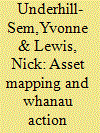|
|
|
Sort Order |
|
|
|
Items / Page
|
|
|
|
|
|
|
| Srl | Item |
| 1 |
ID:
083847


|
|
|
|
|
| Publication |
2008.
|
| Summary/Abstract |
Te Runanga o Te Rarawa is the tribal council representing the interests of the marae (tribal commons) and hapu (a subtribal kin group) that make up the iwi (a Maori tribe) of Te Rarawa in the far north of Aotearoa/New Zealand. In April 2005, officials approached us to help them secure a valuable funding stream tagged to marshalling resources for material development in the area. They sought curriculum vitae and assistance in reframing the funding specifications. Intrigued, armed with a conceptual toolkit drawn from Gibson-Graham's ideas of post-development and asset-based community mapping, and confident that we could add value, we agreed to help. This paper examines the complex politics of our involvement and our changing positioning as researcher subjects. We argue that negotiating a politics of knowledge for projects of this nature requires engagement in complex representational politics of place and divisive identity politics that rage around it. There are no easy protocols for outside researchers, but with appropriate humility and sensitivity to these politics, we can rely on, and should stand up for, the value of our work, which lies in commitments to excellence in scholarship. We cannot and should not seek to control these politics, which will chew us up and spit us out - humanely and with good grace or otherwise. However, good academic work will recognise and adapt to them. In our particular case, we argue that our work had significant value; and in this paper, we trace the production of this value
|
|
|
|
|
|
|
|
|
|
|
|
|
|
|
|
| 2 |
ID:
184519


|
|
|
|
|
| Summary/Abstract |
The National Science Foundation (NSF) recently replaced its long-standing Political Science Program with two new programs: the Security and Preparedness Program and the Accountable Institutions and Behavior Program. This article evaluates the likely impact of the reform by way of original survey data. The NSF Program Change Survey asked past recipients of the Political Science Program Standard Grant to evaluate their own previously funded proposals according to the new NSF program descriptions. Respondents were asked whether they would apply for the same research project under the new thematic programs and, if they would, whether they believed it would be necessary to change the framing or substance of their proposal. Data from the survey suggest that the new NSF program themes are likely to discourage some political scientists from applying, while encouraging many more applicants to shift the framing or substance of their research to accommodate the new call for proposals. In particular, the new Security and Preparedness Program carries significant consequences for new knowledge production.
|
|
|
|
|
|
|
|
|
|
|
|
|
|
|
|
| 3 |
ID:
116855


|
|
|
|
|
| Publication |
2012.
|
| Summary/Abstract |
The World Bank's Consultations with the Poor made development history. One of the most widely discussed piece of development research ever, the Consultations made much of claims to be participatory and to represent the ''voices'' of more than 20,000 ''poor people'' in 23 countries. It findings were used to garland speeches and affirm the overwhelming approval of ''the poor'' for the bank's policy prescriptions, lending them narrative form and moral legitimacy. More than a decade later, references are still made to the ''voices of the poor''. As the MDG deadline draws closer, there is talk of repeating the exercise to inform the next round of goals. In this article, we look back at this exercise, and examine the methodology that was used to ''listen'' to ''the voices of the poor''. Taking one of the regions where the studies were done, Latin America, we trace quotes through from site reports to synthesis. Our findings offer no surprise to those familiar with what Broad describes as the Bank's exercise of the ''art of paradigm maintenance''. But it offers useful pause for reflection on the politics of knowledge production and the encounters between international development agencies and those whom they would call their ''clients''.
|
|
|
|
|
|
|
|
|
|
|
|
|
|
|
|
|
|
|
|
|